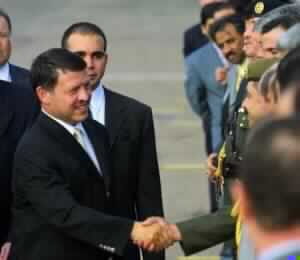HIGHLIGHTS: U.S. Adamant Arafat Should Step Aside||Annan Brands Israel's Actions in the Occupied Territories Illegal||King Abdallah II in Moscow||Israeli Government Adopts Proposal to Keep Some Rural Communities for Jews Only|| STORY: U.S. Secretary of State Colin Powell is setting up Mideast talks with top U.N., European and Russian officials in a bid to broaden support for President Bush's tough line on Yasser Arafat. (Read photo caption)
The administration is adamant in demanding Arafat step aside - even with some reform and reshuffling already evident in the Palestinian movement - and it does not want humanitarian assistance channeled through his Palestinian Authority. Bush, at a White House news conference, said, "It is necessary for a Palestinian state to emerge that will give us all confidence in its ability to fight off terrorist attacks and not receive international aid without stealing the money."
According to Political observers, Bush's call for reform, and his shunning of Arafat as one whose rule is entwined with terror and corruption, has received measured support from U.S. allies in Europe and the Middle East.
On Monday, the president said that some progress has been made and he called on Israel to reciprocate by easing curbs on the movement of Palestinian people.
But the president's refusal to promote a state for the Palestinians - one he says they deserve - until reform takes hold has not quieted European and Arab calls for negotiations to establish a state quickly.
U.N. Secretary General Kofi Annan, Russian Foreign Minister Igor Ivanov and European Union diplomat Javier Solana are expected to meet in New York on Monday with Powell.
Annan has branded Israel's hold on the West Bank and Gaza as an illegal occupation. He also opposes Bush's call for Arafat's ouster.
Diplomats in New York said Annan was inviting officials from Saudi Arabia, Egypt and Jordan - but not Israel - for further talks Tuesday.
The United States long has channeled assistance to the Palestinians through the United Nations and private groups, sidestepping the Palestinian Authority. "I'm sure other donors, as well as we, will want to make sure it's (aid is) properly audited wherever it goes," State Department spokesman Richard Boucher said Monday.
KING ABDALLAH II OF JORDAN IN MOSCOW
Jordan's King Abdullah II arrived Monday in Moscow for talks with President Vladimir Putin on ways to revive Mideast peacemaking.
Jordanian Ambassador Ahmad Ali Mubaydeen said the talks would focus on the Israeli-Palestinian conflict, the situation in Iraq and bilateral relations, according to the Interfax news agency.
Jordan's official Petra news agency Abdullah and Putin would discuss "efforts aimed at restarting peace negotiations." It did not elaborate.
Abdullah, whose country is a key Arab ally of the United States, often consults with Russia and European nations on developments in Mideast peacemaking.
Monday's visit is Abdullah's third to Russia since he ascended to the throne in February 1999. The king is accompanied by his brother and heir, Prince Hamzeh, and Gen. Saad Kheir, chief of the General Intelligence Department.
ISRAELI GOVERNMENT ADOPTS PROPOSAL TO KEEP SOME RURAL COMMUNITIES JEWISH ONLY
The Israeli government has meanwhile approved a proposal that would prevent Arab citizens of Israel from purchasing land in some rural communities and would effectively restrict them to Jewish residents.
The plan must still clear several hurdles in parliament, though it is considered likely to win approval. Meanwhile, liberal and moderate Israelis vowed Monday to fight the proposal, saying it amounts to discrimination.
Dan Meridor, a minister who formerly belonged to Sharon's right-wing Likud party but has since moved to the political center, said if the law is passed it would be seen by Israel's enemies as proof that Zionism is racism, a charge made by some in the Arab and Muslim world.
Arabs make up more than 1 million of Israel's 6.5 million citizens. Most Arabs and Jews live in separate communities although the cities of Jerusalem, Haifa and Acre are mixed. Many Arabs from Nazareth have rented or bought apartments in the neighboring Upper Nazareth unhindered, even though the government intended it to be a Jewish town.
PHOTO CAPTION
Jordan's King Abdullah II shakes hands with unidentified Jordanian officials after his arrival at Moscow's Vnukovo airport, Monday, July 8, 2002. Abdullah is in Russia for talks with President Vladimir Putin on ways to revive Mideast peacemaking. (AP Photo/ Alexander Zemlianichenko
- Author:
& News Agencies - Section:
WORLD HEADLINES


 Home
Home Discover Islam
Discover Islam Quran Recitations
Quran Recitations Lectures
Lectures
 Fatwa
Fatwa Articles
Articles Fiqh
Fiqh E-Books
E-Books Boys & Girls
Boys & Girls  Hajj Rulings
Hajj Rulings Hajj Fatwas
Hajj Fatwas














